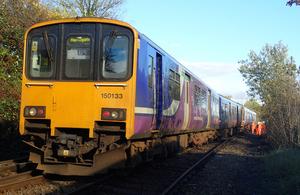Report 16/2016: Derailment at Knaresborough
RAIB has today released its report into a derailment at Knaresborough, 7 November 2015.

Image of incident train near Knaresborough
Summary
At 07:22 hrs on 7 November 2015, a Northern Rail passenger service from York to Harrogate derailed on a set of points on the approach to Knaresborough station. The train consisted of two class 150, 2-car multiple units.
The leading five bogies derailed and damage was sustained by both the train and track. None of the train crew or five passengers on board were injured. The line was re-opened at 12:58 hrs on 8 November 2015.
The signaller in Knaresborough signal box had authorised the train to pass a signal at danger (red), without realising that the set of points beyond the signal was in an unsafe condition. The signaller had not checked the associated points position indicator in the signal box and misinterpreted the significance of being able to reverse the signal lever, leading him to believe that the route was correctly set and safe.
The signaller that day was a mobile operations manager. As a mobile operations manager, his core work was to respond to faults and incidents on the railway network; he operated signal boxes infrequently.
The RAIB concluded that the signaller did not have a full understanding of the working of Knaresborough signal box and that this lack of knowledge may have been the result of either poor initial training or the way his knowledge had been maintained.
An underlying factor to this incident was the lack of robustness of Network Rail’s competence management system for non-signallers (the people within Network Rail whose core duty is not to operate signal boxes but who occasionally have to do so).
In March 2016, Network Rail re-issued the operations manual for the staff in charge of operating signalling equipment. In April 2016, Network Rail started an end-to-end review of the way it manages the competence of its signallers.
Recommendations
As a result of this investigation, RAIB has made one recommendation on Network Rail to review whether the changes that it has recently made to the operations manual have resulted in non-signallers maintaining the required level of knowledge and experience.
RAIB has identified five learning points. The first three learning points relate to the actions of signallers in degraded operating conditions. The fourth learning point relates to the importance of investigating and understanding the underlying reasons for repeated asset failures. The final learning point relates to the actions of drivers when authorised to pass a signal at danger and after an incident.
Notes to editors
- The sole purpose of RAIB investigations is to prevent future accidents and incidents and improve railway safety. RAIB does not establish blame, liability or carry out prosecutions.
- RAIB operates, as far as possible, in an open and transparent manner. While our investigations are completely independent of the railway industry, we do maintain close liaison with railway companies and if we discover matters that may affect the safety of the railway, we make sure that information about them is circulated to the right people as soon as possible, and certainly long before publication of our final report.
- For media enquiries, please call 01932 440015.